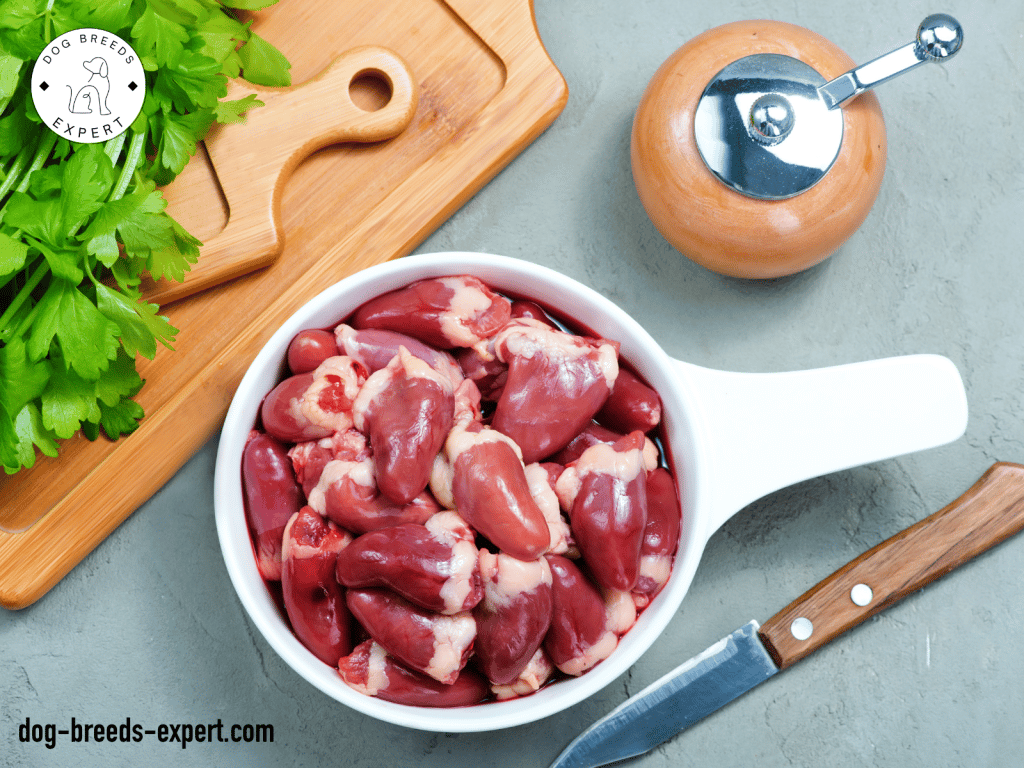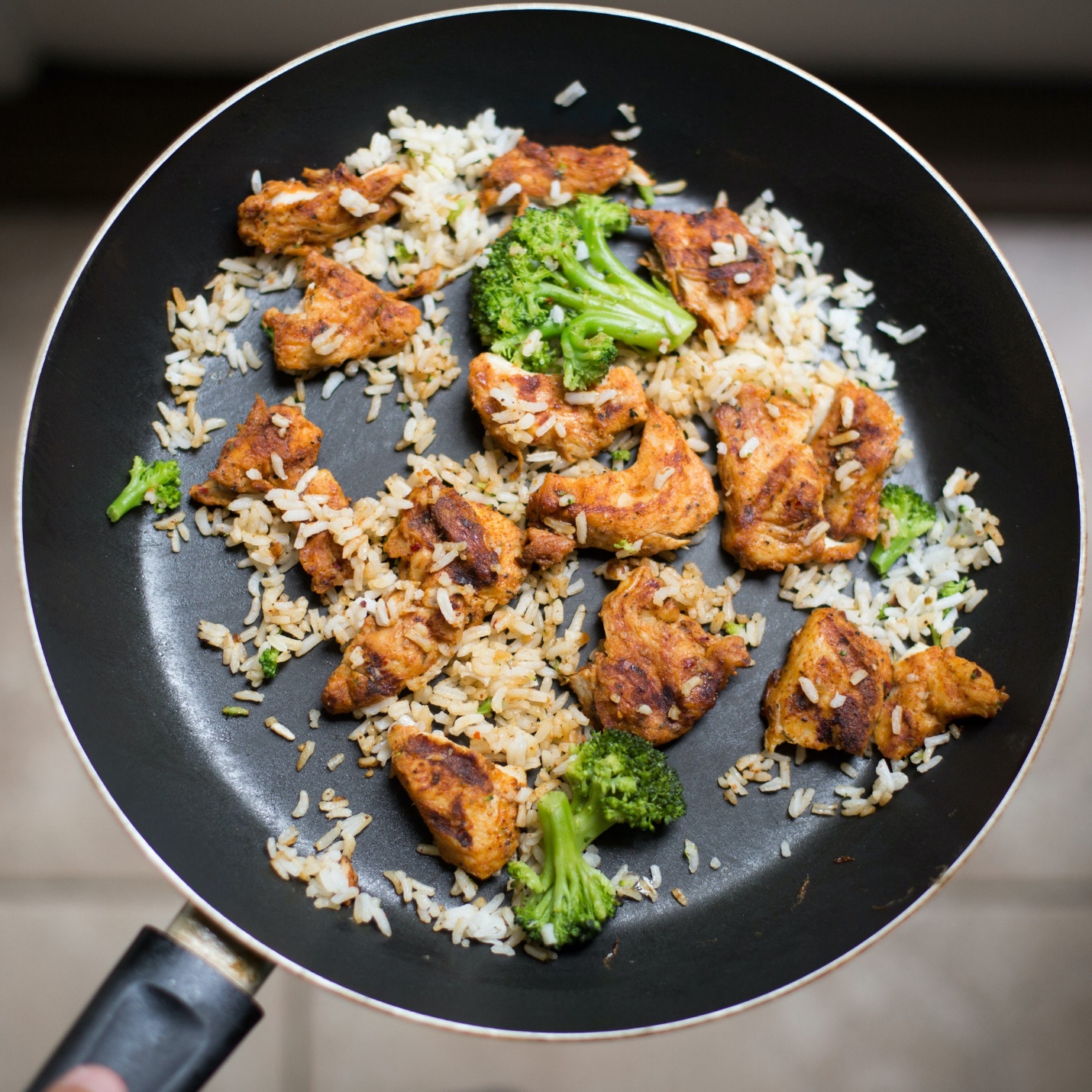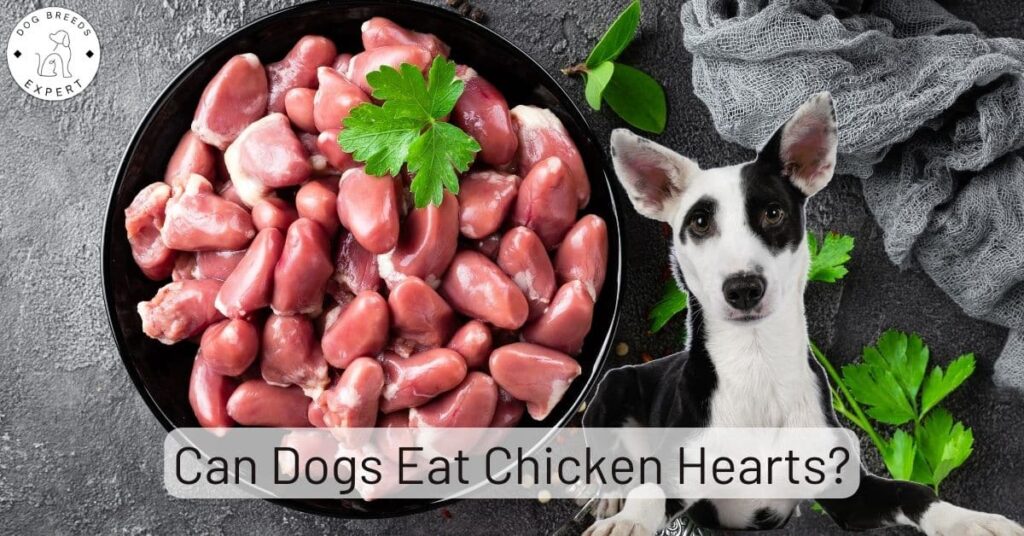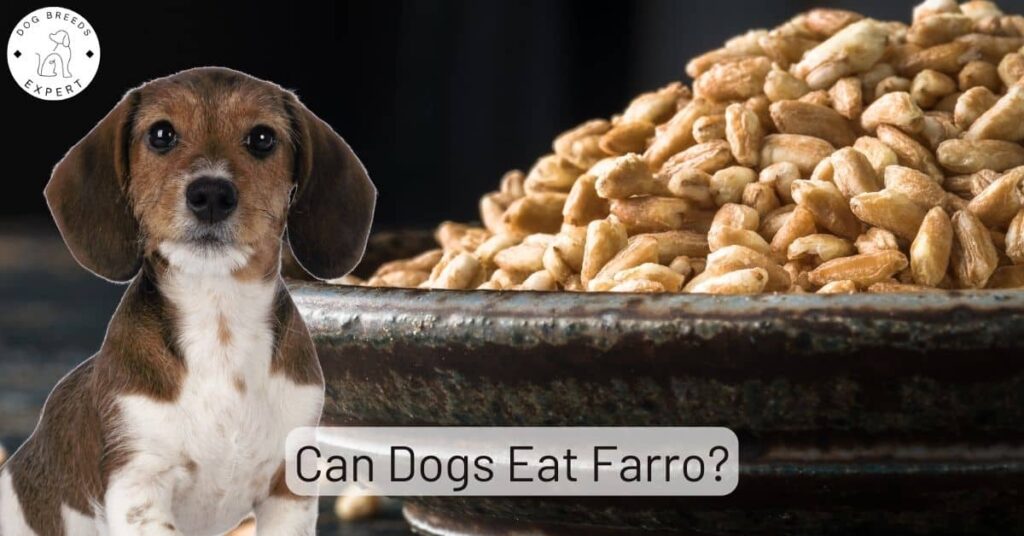Yes, dogs can safely eat properly-cooked chicken hearts. However, it is NOT safe to give dogs uncooked chicken hearts.
When cooked properly, chicken, especially chicken organ meat, is very good for dogs. Many veterinarians recommend soft chicken meat mixed with rice for meals to help a sick dog that has stomach trouble or is not eating.

Never, under any circumstances, give your dogs cooked chicken bones. They are brittle and may injure your dog if they splinter into pieces. It is like giving your dog broken glass to eat when you give a dog cooked chicken bones.
Many ask us if it is good to give chicken hearts to dogs. We encourage safe-cooking practices, and then you can give your dog all the chicken hearts they want.
Here is a complete guide, including nutritional values, cooking tips, and meal suggestions.
Chicken Hearts Nutritional Facts

When cooked properly, chicken hearts are great for dogs to eat. They love the taste of them. They’re a good source of many essential vitamins (especially B-12) and minerals, so your dog can eat them daily. Mixing them with cooked rice is best.
Chicken hearts have a beneficial nutritional profile and may be part of a dog’s regular diet. They are a good source of protein, copper, zinc, iron, and B vitamins.
Here’s a quick list of nutrients found in chicken hearts
A 100-gram (3.5 oz.) serving of properly-cooked chicken hearts has the following nutrients:
- Calories: 185
- Protein: 26 grams
- Fat: 8 grams
- Carbs: 0.1 grams
- Calcium: 19 mg
- Iron: 9.03 mg
- Magnesium: 20 mg
- Phosphorus: 199 mg
- Potassium: 132 mg
- Sodium: 48 mg
- Zinc: 7.3 mg
- Copper: 0.502 mg
- Manganese: 0.107 mg
- Selenium: 8 µg
- Thiamine (B-1): 0.07 mg
- Vitamin B12: 7.29 µg
- Riboflavin: 0.7412 mg
- Pantothenic acid: 2.65 mg
- Folate: 80 µg
- Vitamin B6: 0.32 mg
- Niacin: 2.8 mg
- Vitamin C: 2.8 mg
- Vitamin A: 8 µg
Can Dogs Eat Chicken Hearts?
Yes, certainly. Cooked chicken hearts are good for them.
Are Chicken Hearts Good For Dogs?
Chicken hearts are quite good for dogs as an excellent source of protein, vitamins, and minerals.
Do Dogs Like Chicken Hearts?
Most dogs find the taste of chicken hearts terrific and will gobble them up voraciously.
How Many Chicken Hearts Can a Dog Eat?
A half cup of chicken hearts mixed with cooked rice is good for a small dog, up to 20 lbs. Feed this amount twice daily. Add another half cup for every 10 lbs. larger.
Here’s how many chicken hearts to feed your dog
| Age | Feed This Amount Twice Per Day. |
| Puppy | 50 to 100 grams daily mixed with rice per 5 kilograms in weight |
| Adult dog | 200 to 300 grams daily mixed with rice for dogs up to 20 lbs. Add 100 grams more for every 5 to 10 lbs. more in weight. |
Chicken meat, including organ meat like chicken hearts, can be a regular part of a dog’s diet.
How Often Can A Dog Eat Chicken Hearts?

It is safe to give cooked chicken hearts or pieces of cooked chicken (with all bones removed) daily. The best way to serve them is mixed with rice and some chopped cooked vegetables. You can boil the chicken and then fry it in a pan with rice and vegetables. Give some to the dog that is not salted or spiced, and eat some yourself.
Dogs Are Genetically Meat-Eaters
Dogs are mostly meat-eaters. They will also eat vegetables. In the wild, they will eat any animal meat that they catch or find. They are scavengers who will dig through a rubbish bin to find things to eat using their smart sense of smell to locate the food in the trash pile.
Many dogs have the instinct to kill small animals, such as rodents, rabbits, possums, and squirrels. They will often kill chickens.
What does your dog need to be happy?
- Dog food. Dogs do better with freshly-prepared food than canned or dry dog food.
- Fresh water. Clean, fresh water is good for a dog’s health. Change the water daily if possible, and make sure the water bowl is never empty. Dogs may not drink often, but when they get thirsty, they may drink quite a bit, especially on a warm day after playing outside.
- A Dry, Comfortable Place to Sleep. Having a nice place to sleep will improve a dog’s health and happiness.
- Chewable treats and dog toys. Using treats and toys designed to keep your dog’s teeth clean is a good idea.
- Love. The most important ingredient in a dog’s life is you and the love you can share by hugging your dog and staring into your dog’s loving eyes.
What are Other Healthy Alternatives to Chicken Hearts in a Dog’s Diet?
Now that you know chicken hearts are good for dogs, you might wonder about other meats.
Here are some other meats and vegetables that dogs like.
- Chicken gizzards
- Chicken liver
- Turkey hearts
- Turkey gizzards
- Turkey liver
- Beef heart
- Beef liver
- Beef kidney
- Cooked potato
- Cooked sweet potato
- Cooked yams
- Cooked carrots
- Cooked broccoli
- Cooked squash
- Cooked zucchini
Frequently Asked Questions
Are chicken hearts safe for dogs?
When cooked properly, chicken hearts are safe and nutritious for a dog to eat. They are easy to cook, you heat them in water, and once the water comes to a rapid boil, you boil them for a half hour minimum, up to an hour. This sustained heat (212°F = 100°C) can kill bacteria and viral pathogens.
Can chicken hearts make my dog sick?
Yes, chicken hearts can make a dog sick if not cooked properly.
My dog ate chicken hearts. What should I do?
If the chicken hearts were fully-cooked, you need not be concerned.
If the dog eats raw chicken meat, it is dangerous. Uncooked chicken meat may contain Salmonella, Listeria, E. coli, and other serious pathogens. Call your vet.
If the chicken hearts were NOT fully-cooked, and you discover this incident right away before the food has had much time to digest, then you have the choice of making the dog vomit up the food and dispose of it without allowing the dog to re-eat it or other pets to eat it. You can get medications from the vet called emetics, which induce vomiting. To work, you must do this very quickly after the dog has eaten the raw chicken.
If the raw chicken has already had some time in the stomach to be digested, the dog may become sick anytime over the following seven days. You need to watch your dog carefully to see if any signs of food poisoning, bacterial infection, or viruses that make the dog sick.
Go to the vet immediately if your dog starts to get ill. Symptoms may include fever, vomiting, diarrhea, lethargy, refusal to eat, and stomach pain.
Photo Credits
Photo by Karolina Grabowska: https://www.pexels.com/photo/cute-dog-in-heart-sunglasses-5713349/
Photo by Keegan Evans: https://www.pexels.com/photo/white-rice-chicken-and-broccoli-on-black-non-stick-pan-105588/



